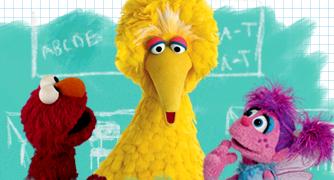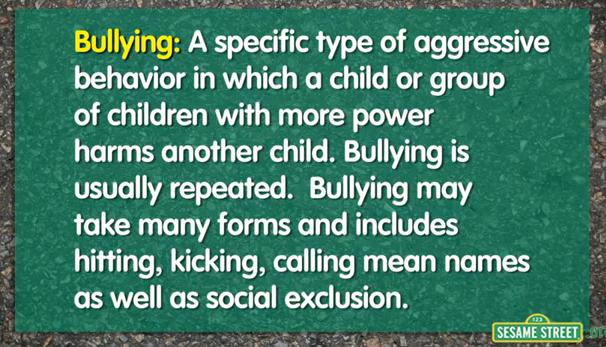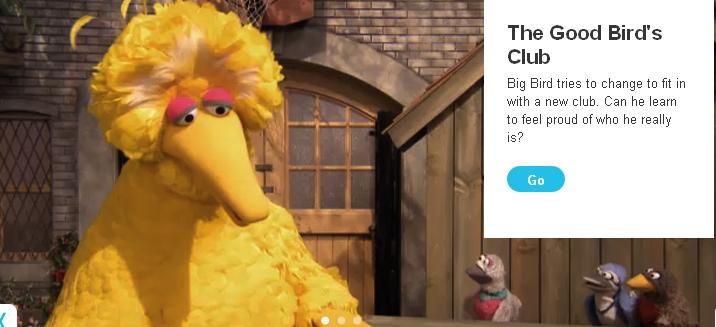 Oct. 18, 2011 “Look at those feet!” Big Bird is told. “They’re ridiculous!” –“They are?”
Oct. 18, 2011 “Look at those feet!” Big Bird is told. “They’re ridiculous!” –“They are?”
As he tries to get accepted into the “Good Bird Club,” he shifts from “happy to be me” to hanging his feathered beak with insecurity and scuffling his giant orange clompers in ‘not good enough’ mode…Before you roll your eyes at Sesame Street’s bullying prevention program as yet another media bandwagoning effort taking place in October for National Anti-Bullying Awareness Month, understand that Sesame Workshop’s preschool crowd is a perfect “show-n-tell” community to inject pro-social learning to show ‘right from wrong’ from the get go, as prevention vs. intervention.
“Isn’t that a parenting job?” Yes…AND a societal one, to role model social emotional learning and what is and isn’t acceptable in an increasingly coarse culture of snark tanks and sarcasm.
How are kids supposed to figure out social norming when “everyone’s doing it” drops the limbo pole to a new level of low?
Whether it’s teens trying to figure out what a healthy relationship looks like sans ‘hottie’ objectification and controlling, abusive power plays, or preschoolers sorting out the difference between teasing and bullying or tattling vs reporting…media as ‘super peer’ has served up some pretty toxic mixed messages on the vapid values front, rewarding the outlandish and dismissing compassionate kindness as ‘cheesy’ or ‘goody-good’ or ‘lame.’
Author Trudy Ludwig who serves as an expert on the Sesame Workshop parenting panel explains it well, (shown at left talking to a ‘bystander Blue Jay’ in video #4)
“We’ve normalized this abnormal behavior far too long; often media glamorizes meanness and we need to redefine what it means to be a popular person…popularity through acceptance as opposed to popularity through dominance.”
You can say that again. When Sesame Street itself comes out with a bullying program only to be hacked and bullied by some rogue hijacking hipster being XXXtremely non-kid friendly shutting the Sesame YouTube channel down to mop up the mess (really YouTube, you need to put some of your profits into security and moderation methodology) it does make you think that literally EVERYone is in a race to the bottom to say how ‘outrageous’ they can be for their 15 minutes of bullying, mean-spirited media fame.
But isn’t bullying “just a rite of passage? Aren’t we hot-housing kids? Isn’t it better to teach your kids to stick up for themselves than be a wimp? They’ll need these skills in the real world”…yadayada…?
 This is where Sesame Workshop looms large in educating busy PARENTS as well as the kids, in a 5-part short series of videos that cuts to the chase answering the most common “that was then, this is now” media myths and misfires that I hear repeatedly. (what’s changed, retaliation, learned behaviors, being mean right back, parent on parent aggression etc)
This is where Sesame Workshop looms large in educating busy PARENTS as well as the kids, in a 5-part short series of videos that cuts to the chase answering the most common “that was then, this is now” media myths and misfires that I hear repeatedly. (what’s changed, retaliation, learned behaviors, being mean right back, parent on parent aggression etc)
Sesame Workshop proceeds to refute “perception vs reality” of today’s bullying (cyber, schoolyard, sibling, and home life) backed by resources, facts, and finite examples that almost seem to slide off the “most popular FAQ list ”of every parent education event I’ve attended.
They ask the tough stuff pre-K parents and educators often wonder about and distill it into handy information capsules from a panel of child dev experts who don’t mince words. Such as:
What’s the difference between teasing and bullying? We see this in play relationships akin to adults’ sarcasm…When teasing is occasional, mutual, and even name-calling in friendly/back and forth joshing it’s one thing, when it shifts to intent to harm or hurt, is done so repeatedly, with a power/dynamic that shifts, via put downs or one-way dominance exerting control (one primary party feels badly, isolated) it’s bullying.
What’s the difference between tattling vs. reporting? Trudy Ludwig sums, “tattling is when you’re trying to get kids IN trouble when they aren’t hurting themselves or others (e.g. “he ate a cookie when you said not to”) whereas reporting is when you’re trying to help kids OUT of trouble because they’re getting hurt.” (emotionally/physically-telling a trusted adult)
Is a forced “sorry” appropriate? No, it’s important to ‘show NOT tell’ in order to make up for the hurt feelings, otherwise the insincerity can further revictimize the child, reliving the instance…they need to be ‘ready to accept’ the overture, when it’s offered with genuine amends.
These are the types of questions the Sesame Workshop parenting videos address…all those “I was just wondering that” moments put to media like a mental relay on record.
Whether it’s learning to understand a child’s ‘bystander guilt’ or coaching adult peers on how to set up school climates, clubs, teams, or communities that aren’t corrosive, the tips offered using the Sesame Workshop scenarios bring heightened awareness and pragmatic solutions without buying into ‘alarmist’ media hype of “bullying explosions” and “skyrocketing” superlatives.
They did a good job of reiterating that bullying is not ‘rampant’ it’s just taken on new forms of expression in media, and the attention given the topic can be a GOOD thing…
My concern, given our amped and ramped decibel level of media volume is that all the ‘talk’ about bullying will begin to desensitize folks into ‘bullying burnout’ where we turn a deaf ear onto the reality of the problem instead of listening, affirming, and discerning the nuance.
It doesn’t take a newspaper headline or ‘bullycide’ to wound and damage to the core and get children off on the wrong foot, so prevention rather than intervention (much like health/wellness and nutrition habits) are much easier to set early on than ‘counter-act’ later.
Sesame Workshop has done a great job leveraging the dilemmas and some problem-solving role play solutions in their familiar charismatic storytelling style…with talking points about the show that read like an age-appropriate media literacy cheat sheet. Any child care provider from babysitter to sleepover host can use these “watch and discuss” teaching moments, along with the Good Birds Club show in its entirety and related kidvid fun.
As for parents? The guest panel of experts is well worth the 5-10 minute segments of run time in each one. Have at it!
Meanwhile, here are just a few tips below from Trudy Ludwig’s fictional Confessions of a Former Bully book, one of many in her social emotional learning series.
She has a new one out called “Better Than You” all about bragging, arrogance, and empathy to deconstruct the messages served up in sports and play yards regularly…I think I’ll interview her on that separately.
She uses her fiction books as her medium of choice, bringing characters to life that kids can relate to while weaving in hands-on life skills and usable teaching moments that are grounded in research-based social emotional learning.
My favorite part is where Katie, the main character, encounters a stuttering classmate…
“I knew he couldn’t help it, but that didn’t stop me from rolling my eyes and laughing. Mr Randall looked mad.
…I thought he was going to give me the same old boring talk about how it’s not nice to laugh and make fun of other kids. But he didn’t. Instead, he told us about a new class rule: kids with freckles have to stay after class to clean up the classroom. WHAT?! I thought. I’ve got freckles. That is SO not fair!”
In another part she confesses what bullies really WANT from you…in terms of reaction (mad, scared, sad, attention, etc) and in a little ‘PowerVac3000’ illustration, she declares,
“When I pushed your buttons, it made me feel more powerful than you. And I liked that feeling so much that I turned into a power-sucking machine—sucking all the power right out of you and putting it into me Don’t let kids like me do that!”
Then she proceeds to give tips on how kids can hold their power without being mean back or making it worse. Practical tips. Play ground tips. (And frankly, I think I’ve used a few of them in business meetings over the decades…)
In the back she has a great resource list with some fabulous books for adults AND for kids along with studies cited, organizations, websites and more.
Whether it’s the new Sesame Workshop shows or socio-emotional learning books like Trudy’s, whatever you do, try not to desensitize and burnout from bullying banter…
…Keep your eyes, ears and heart open to receive whatever those wee ones are trying to tell you.
Here’s a 5-minute Intro to the parenting panel to give you a who’s who overview:
Related Rescs on Bullying by Amy Jussel, Shaping Youth
Survivor, The Lunch Table Edition: Social Emotional Learning
Tips For Handling a Real Life Sue Sylvester From Glee (adult bullies)
Rachel Simmons on Mythbusting/Mean Girl Media (Odd Girl Out)
Recap of White House Conference on Bullying Prevention
Using Kid Lit to Read the Right Message About Bullying
Bullying and the Special Needs Child: You Must Be the New Kid
Textual Harrassment: That’s Not Cool
Harris Interactive: How Cyberbullying is Shaping Youth Savvy
Internet Safety: Media Literacy Tips from Industry Insiders Pt 1
Cybersafety Online, Tips from the Inside Out Pt2
Cyberbullying Tragedies & Internet Safety (w/E-Moderation)
Predators=Marketers + Frenemies: Keeping Kids Safe Online
Curse of the Good Girl Interview with Rachel Simmons
KidLit: Resources Using Children’s Literature to Talk About Bullying
Author Trudy Ludwig’s shortlist (by age) on Rachel Simmons’ blog
Books That Heal Kids blog/bullying
Great Kid Lit Reading Compilation: BestChildrensBooks.com
Stand Tall, Molly Lou Melon by Patty Lovell (complete w/activities-lesson plan)
Chrysanthemum by Kevin Henkes
Thank You Mr Falker by Patricia Polacco (dyslexia/special needs)
Arthur’s April Fool by Marc Brown
The Berenstain Bears and the Bully by Stan Berenstain
Classics like The Hundred Dresses by Eleanor Estes
- Belling the Tiger by Mary Stolz
- A Grimm’s Fairy Tale featuring bullying
- Lord of the Flies by William Golding
- The Ugly Duckling
Related This Week: NYTimes Opinion: The Bleakness of the Bullied









I’m so glad you wrote about this and so happy that Sesame Street is doing this. As a mother of an almost-4-year-old, it has surprised me how early the teasing starts, and the role playing around excluding, comparing, and competing. It is more than wonderful that a trusted and beloved source is tackling so much of this in an age appropriate way that’s helpful for the children and their parents.
Thanks Karen, I continue to be amazed by Sesame Street’s depth of coverage on topics like this…
Having just written the Veterans Day 11-11-11 post, I included their program for military families adjusting to deployment abroad, or soldiers returning home w/all the changes therein, etc. too…pretty amazing use of media for socio-emotional support for kids.
As a former military brat (dad was USN) these kinds of ‘help explain/coping skills for resiliency’ interaction using media sure would’ve come in handy (huge salute to my dear mom who had to navigate these explanations and behavioral shifts without a compass or an Elmo doll ha.) Here’s their Talk, Listen & Connect socio-emotional learning link direct to their site: http://www.sesameworkshop.org/initiatives/emotion/tlc
Here’s their Talk, Listen & Connect socio-emotional learning link direct to their site: http://www.sesameworkshop.org/initiatives/emotion/tlc